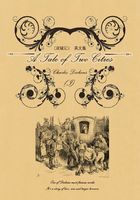It is indispensable to present the accomplished lady who was of sufficient importance in the suite of the Dorrit Family to have a line to herself in the Travellers' Book.
Mrs General was the daughter of a clerical dignitary in a cathedral town, where she had led the fashion until she was as near forty-five as a single lady can be. A stiff commissariat officer of sixty, famous as a martinet, had then become enamoured of the gravity with which she drove the proprieties four-in-hand through the cathedral town society, and had solicited to be taken beside her on the box of the cool coach of ceremony to which that team was harnessed. His proposal of marriage being accepted by the lady, the commissary took his seat behind the proprieties with great decorum, and Mrs General drove until the commissary died. In the course of their united journey, they ran over several people who came in the way of the proprieties; but always in a high style and with composure.
The commissary having been buried with all the decorations suitable to the service (the whole team of proprieties were harnessed to his hearse, and they all had feathers and black velvet housings with his coat of arms in the corner), Mrs General began to inquire what quantity of dust and ashes was deposited at the bankers'. It then transpired that the commissary had so far stolen a march on Mrs General as to have bought himself an annuity some years before his marriage, and to have reserved that circumstance in mentioning, at the period of his proposal, that his income was derived from the interest of his money. Mrs General consequently found her means so much diminished, that, but for the perfect regulation of her mind, she might have felt disposed to question the accuracy of that portion of the late service which had declared that the commissary could take nothing away with him.
In this state of affairs it occurred to Mrs General, that she might 'form the mind,' and eke the manners of some young lady of distinction. Or, that she might harness the proprieties to the carriage of some rich young heiress or widow, and become at once the driver and guard of such vehicle through the social mazes. Mrs General's communication of this idea to her clerical and commissariat connection was so warmly applauded that, but for the lady's undoubted merit, it might have appeared as though they wanted to get rid of her. Testimonials representing Mrs General as a prodigy of piety, learning, virtue, and gentility, were lavishly contributed from influential quarters; and one venerable archdeacon even shed tears in recording his testimony to her perfections (described to him by persons on whom he could rely), though he had never had the honour and moral gratification of setting eyes on Mrs General in all his life.
Thus delegated on her mission, as it were by Church and State, Mrs General, who had always occupied high ground, felt in a condition to keep it, and began by putting herself up at a very high figure. An interval of some duration elapsed, in which there was no bid for Mrs General. At length a county-widower, with a daughter of fourteen, opened negotiations with the lady; and as it was a part either of the native dignity or of the artificial policy of Mrs General (but certainly one or the other) to comport herself as if she were much more sought than seeking, the widower pursued Mrs General until he prevailed upon her to form his daughter's mind and manners.
The execution of this trust occupied Mrs General about seven years, in the course of which time she made the tour of Europe, and saw most of that extensive miscellany of objects which it is essential that all persons of polite cultivation should see with other people's eyes, and never with their own. When her charge was at length formed, the marriage, not only of the young lady, but likewise of her father, the widower, was resolved on. The widower then finding Mrs General both inconvenient and expensive, became of a sudden almost as much affected by her merits as the archdeacon had been, and circulated such praises of her surpassing worth, in all quarters where he thought an opportunity might arise of transferring the blessing to somebody else, that Mrs General was a name more honourable than ever.
The phoenix was to let, on this elevated perch, when Mr Dorrit, who had lately succeeded to his property, mentioned to his bankers that he wished to discover a lady, well-bred, accomplished, well connected, well accustomed to good society, who was qualified at once to complete the education of his daughters, and to be their matron or chaperone. Mr Dorrit's bankers, as bankers of the county widower, instantly said, 'Mrs General.'
Pursuing the light so fortunately hit upon, and finding the concurrent testimony of the whole of Mrs General's acquaintance to be of the pathetic nature already recorded, Mr Dorrit took the trouble of going down to the county of the county-widower to see Mrs General, in whom he found a lady of a quality superior to his highest expectations.
'Might I be excused,' said Mr Dorrit, 'if I inquired-ha-what remune-'
'Why, indeed,' returned Mrs General, stopping the word, 'it is a subject on which I prefer to avoid entering. I have never entered on it with my friends here; and I cannot overcome the delicacy, Mr Dorrit, with which I have always regarded it. I am not, as I hope you are aware, a governess-'
'O dear no!' said Mr Dorrit. 'Pray, madam, do not imagine for a moment that I think so.' He really blushed to be suspected of it.
Mrs General gravely inclined her head. 'I cannot, therefore, put a price upon services which it is a pleasure to me to render if I can render them spontaneously, but which I could not render in mere return for any consideration. Neither do I know how, or where, to find a case parallel to my own. It is peculiar.'
No doubt. But how then (Mr Dorrit not unnaturally hinted) could the subject be approached. 'I cannot object,' said Mrs General-'though even that is disagreeable to me-to Mr Dorrit's inquiring, in confidence of my friends here, what amount they have been accustomed, at quarterly intervals, to pay to my credit at my bankers'.'
Mr Dorrit bowed his acknowledgements.
'Permit me to add,' said Mrs General, 'that beyond this, I can never resume the topic. Also that I can accept no second or inferior position. If the honour were proposed to me of becoming known to Mr Dorrit's family-I think two daughters were mentioned?-'
'Two daughters.'
'I could only accept it on terms of perfect equality, as a companion, protector, Mentor, and friend.'
Mr Dorrit, in spite of his sense of his importance, felt as if it would be quite a kindness in her to accept it on any conditions. He almost said as much.
'I think,' repeated Mrs General, 'two daughters were mentioned?'
'Two daughters,' said Mr Dorrit again.
'It would therefore,' said Mrs General, 'be necessary to add a third more to the payment (whatever its amount may prove to be), which my friends here have been accustomed to make to my bankers'.'
Mr Dorrit lost no time in referring the delicate question to the county-widower, and finding that he had been accustomed to pay three hundred pounds a-year to the credit of Mrs General, arrived, without any severe strain on his arithmetic, at the conclusion that he himself must pay four. Mrs General being an article of that lustrous surface which suggests that it is worth any money, he made a formal proposal to be allowed to have the honour and pleasure of regarding her as a member of his family. Mrs General conceded that high privilege, and here she was.
In person, Mrs General, including her skirts which had much to do with it, was of a dignified and imposing appearance; ample, rustling, gravely voluminous; always upright behind the proprieties. She might have been taken-had been taken-to the top of the Alps and the bottom of Herculaneum, without disarranging a fold in her dress, or displacing a pin. If her countenance and hair had rather a floury appearance, as though from living in some transcendently genteel Mill, it was rather because she was a chalky creation altogether, than because she mended her complexion with violet powder, or had turned grey. If her eyes had no expression, it was probably because they had nothing to express. If she had few wrinkles, it was because her mind had never traced its name or any other inscription on her face. A cool, waxy, blown-out woman, who had never lighted well. Mrs General had no opinions. Her way of forming a mind was to prevent it from forming opinions. She had a little circular set of mental grooves or rails on which she started little trains of other people's opinions, which never overtook one another, and never got anywhere. Even her propriety could not dispute that there was impropriety in the world; but Mrs General's way of getting rid of it was to put it out of sight, and make believe that there was no such thing. This was another of her ways of forming a mind-to cram all articles of difficulty into cupboards, lock them up, and say they had no existence. It was the easiest way, and, beyond all comparison, the properest.
Mrs General was not to be told of anything shocking. Accidents, miseries, and offences, were never to be mentioned before her. Passion was to go to sleep in the presence of Mrs General, and blood was to change to milk and water. The little that was left in the world, when all these deductions were made, it was Mrs General's province to varnish. In that formation process of hers, she dipped the smallest of brushes into the largest of pots, and varnished the surface of every object that came under consideration. The more cracked it was, the more Mrs General varnished it. There was varnish in Mrs General's voice, varnish in Mrs General's touch, an atmosphere of varnish round Mrs General's figure. Mrs General's dreams ought to have been varnished-if she had any-lying asleep in the arms of the good Saint Bernard, with the feathery snow falling on his house-top.















